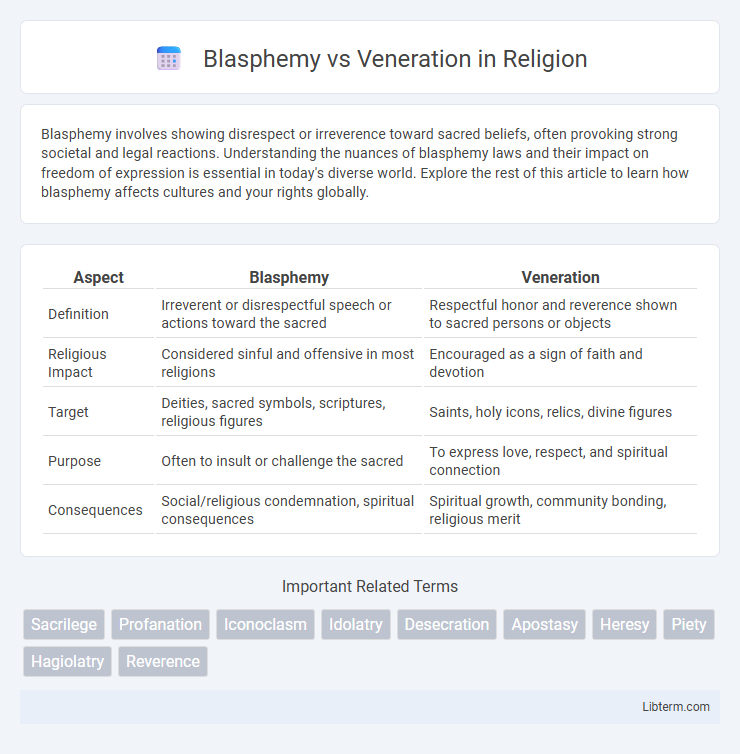Blasphemy involves showing disrespect or irreverence toward sacred beliefs, often provoking strong societal and legal reactions. Understanding the nuances of blasphemy laws and their impact on freedom of expression is essential in today's diverse world. Explore the rest of this article to learn how blasphemy affects cultures and your rights globally.
Table of Comparison
| Aspect | Blasphemy | Veneration |
|---|---|---|
| Definition | Irreverent or disrespectful speech or actions toward the sacred | Respectful honor and reverence shown to sacred persons or objects |
| Religious Impact | Considered sinful and offensive in most religions | Encouraged as a sign of faith and devotion |
| Target | Deities, sacred symbols, scriptures, religious figures | Saints, holy icons, relics, divine figures |
| Purpose | Often to insult or challenge the sacred | To express love, respect, and spiritual connection |
| Consequences | Social/religious condemnation, spiritual consequences | Spiritual growth, community bonding, religious merit |
Understanding Blasphemy: Definitions and Contexts
Blasphemy involves speech or actions that show disrespect or irreverence toward sacred entities, religious symbols, or deities, often provoking social or legal consequences depending on cultural and legal contexts. Definitions of blasphemy vary widely across religions and societies, reflecting diverse thresholds for what constitutes offensive or unacceptable behavior. Understanding blasphemy requires examining historical, theological, and legal frameworks that shape how reverence and offense are interpreted in different communities.
What is Veneration? Meaning and Practices
Veneration refers to the profound respect and reverence shown toward saints, sacred objects, or divine figures within various religious traditions. It involves devotional practices such as prayer, offering, and rituals aimed at honoring and seeking blessings from the revered entity without equating them to the divine essence worshipped in monotheistic faiths. Unlike blasphemy, which entails disrespect or irreverence toward sacred entities, veneration upholds spiritual devotion and fosters a connection between believers and the holy.
Historical Perspectives on Blasphemy
Historical perspectives on blasphemy reveal a diverse range of interpretations across cultures and eras, often shaped by prevailing religious doctrines and socio-political frameworks. In many ancient and medieval societies, blasphemy was criminalized and frequently punished by law, reflecting the intertwining of religious authority with governance. These historical attitudes underscore how blasphemy was not only a spiritual offense but also a threat to social order and power structures.
Veneration Across Religions and Cultures
Veneration manifests uniquely across religions and cultures, often involving rituals, prayers, and offerings to honor sacred figures, ancestors, or deities, reflecting deep respect rather than worship. In Christianity, veneration of saints emphasizes honoring their holy example, distinct from the worship reserved for God, while Hinduism involves rituals venerating gods and ancestors through puja ceremonies. East Asian cultures, including Confucianism and Shinto, incorporate ancestor veneration and kami reverence as expressions of cultural continuity and spiritual connection.
Key Differences Between Blasphemy and Veneration
Blasphemy involves disrespect or irreverence towards sacred entities, often expressed through speech or actions that insult religious beliefs or deities. Veneration is the act of showing deep respect, honor, or reverence towards holy figures, objects, or traditions, often through rituals or prayers. The key difference lies in intent and perception: blasphemy offensively challenges or mocks sacredness, while veneration upholds and celebrates it with devotion.
Blasphemy Laws: Global Variations and Impact
Blasphemy laws vary significantly worldwide, with strict regulations in countries like Pakistan, Saudi Arabia, and Iran imposing severe penalties for disrespecting religious symbols or doctrines. These laws impact freedom of expression, often leading to legal persecution, social ostracism, and violence against accused individuals. Enforcement differences reflect cultural, religious, and political contexts, shaping the global landscape of religious tolerance and legal protections.
Cultural Significance of Veneration
Veneration holds profound cultural significance as a deeply rooted practice that honors and preserves the heritage, values, and spiritual beliefs of communities through rituals and symbols. It fosters social cohesion by reinforcing shared identity, respect for traditions, and intergenerational transmission of moral frameworks. Veneration practices are often protected and celebrated within cultural narratives, distinguishing them sharply from blasphemy, which is perceived as a violation or disrespect against sacred elements.
Freedom of Expression vs. Religious Sensitivity
Blasphemy laws often clash with freedom of expression by restricting speech deemed offensive to religious beliefs, posing challenges to open dialogue and artistic creativity. Protecting religious sensitivity emphasizes respect for diverse faiths, aiming to prevent hate speech and social discord, yet may limit critical discussion and satire. Balancing these interests requires nuanced legal frameworks that uphold individual rights while fostering mutual respect in pluralistic societies.
Case Studies: Controversies and Resolutions
Case studies of blasphemy versus veneration reveal deeply rooted cultural, religious, and legal conflicts, such as the Danish cartoons controversy and the Charlie Hebdo attacks, highlighting the tension between freedom of expression and religious respect. Resolutions often involve a combination of legal rulings, diplomatic negotiations, and community dialogues aimed at balancing rights and reducing offense, exemplified by court decisions reinforcing free speech alongside campaigns promoting interfaith understanding. Analyzing these cases underscores the complexities in defining blasphemy and veneration across diverse societies and the ongoing challenge of coexistence in pluralistic environments.
Balancing Respect and Critique in Pluralistic Societies
Balancing respect and critique in pluralistic societies requires nuanced understanding of the distinctions between blasphemy and veneration, where blasphemy involves intentional disrespect or insult towards sacred symbols or beliefs, while veneration expresses deep reverence and honor. Legal frameworks and social norms must protect freedom of expression without infringing on religious sentiments, fostering coexistence and minimizing conflict. Promoting interfaith dialogue and education enhances mutual understanding and supports peaceful pluralism by navigating these sensitivities thoughtfully.
Blasphemy Infographic

 libterm.com
libterm.com